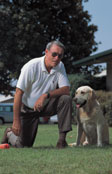 
Molecular
medicine
A
new generation of anti-cancer drugs offers many patients a second
lease on life. But the drugs aren’t available everywhere.
Two Octobers
ago Bill Gilson, 58, was given only a few months to live. The Sacramento
commercial real estate broker had been battling an untreatable form
of lung cancer for almost a year. Now the cancer was winning. At
home in Stockton, he and his wife of 26 years made plans for their
last Thanksgiving together.
But first the desperately ill man consulted David Gandara, associate
director for clinical research at UC Davis Cancer Center and a top
lung cancer specialist. Gandara suggested a long shot — an
experimental drug, Iressa, that had reportedly helped two patients
in other cities. With little to lose, Gilson agreed to participate
in a clinical trial of the drug.
The gamble saved Gilson’s life. Within weeks, tumors began
evaporating from his lungs. Today, cancer-free, he plays tennis
and golf when he’s not working full-time, and has enough energy
left over to help wife Jackie run a rescue operation for abandoned
Labrador retrievers.
If Iressa continues to demonstrate safety and effectiveness in clinical
trials, it may soon earn U.S. Food and Drug Administration approval.
If so, any doctor in the country will be able to prescribe it. But
the drug was available first at a select group of cancer research
centers, and to the patients who found their way to them.
  

Home |
Table of Contents |
To our Readers |
Building on Basics
Focusing on Patients |
In Translation |
First Steps
Campus Connection |
Benefactors |
News in Brief
UC Davis Health System |
© 2000, 2001, 2002 UC Regents. All rights reserved.
|
 |



 

Bill
Gilson (shown with Moose) is alive today thanks to a clinical trial
at UC Davis Cancer Center.
|


